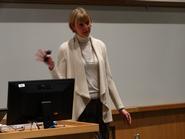
Imagine suing your doctor or medical team for the harm of not providing you with the option of terminating your pregnancy. While it may sound fantastical, this is the actual situation in a subset of medical malpractice lawsuits called “wrongful birth.” The Oral Communication Center recently sponsored a lecture titled “You Should Never Have Been Born: The Rhetorical Conundrum of Wrongful Birth Lawsuits,” by Vesta T. Silva , associate professor of communication arts at Allegheny College.
As a rhetorician, Silva studies the public discourse about wrongful birth lawsuits in the United States and Canada. Advancements in genetic testing and changing cultural definitions of risk and responsibility have made the conundrum of wrongful birth lawsuits more and more prevalent among families of severely disabled children, and even among the disabled children themselves.
U.S. courts first recognized “wrongful birth” as a legitimate claim in 1978, and it is now legal in 30 states. According to Silva, “Despite the seemingly controversial and sensational nature of [wrongful birth] cases, both the scholarly discourses and the news media narratives about them are generally supportive of the parents and their suits.” In her lecture Silva said that the public discussion and media coverage tend to focus on the disability and medical mistakes when they should instead focus on the harrowing moral choices the prospective parents must face.
In these controversial cases, according to Silva, eugenics meets neoliberalism: improvement of the human race meets rational self-interest through deregulation and privatization. Modern day families, medical institutions, and media sources may think that the rise of genetic testing fosters perfection of the human race, but it results in the moral dilemma of choosing what to do with such information, especially when it affects life within the womb.
Silva analyzed the discourse around several wrongful birth cases, which she said “serve as limit cases of wider genetic models of health and responsibility” within 21st century discussions of risk, identity and abortion. She challenged her audience not only to think about these cases but also to consider their own stance on the moral issues involved.
During the discussion following the lecture, Silva was asked about the discourses of wrongful birth lawsuits among disabled children themselves and in the medical community. She responded that there was “very little [general discussion] at this point.” The discussion tends to focus on the legal aspects of such suits and appears most often in public media channels and through community dialogue.
Later that afternoon Silva led a faculty development workshop titled “From Idea to Assessment: Integrating Speaking Assignments Effectively in Courses.”
